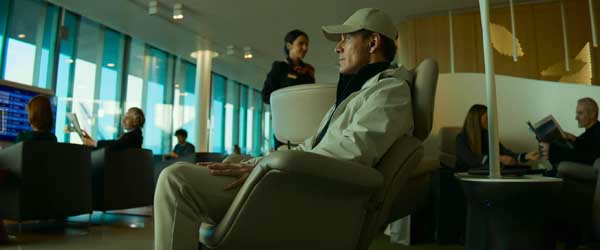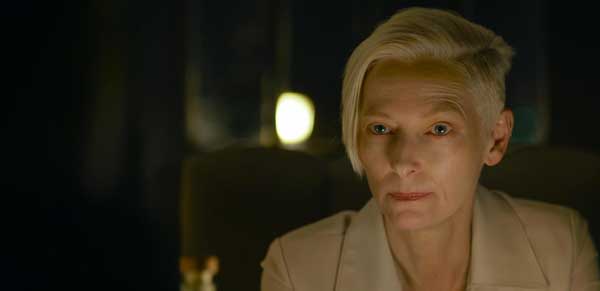Filmmakers, Screenwriters, Performance, Reviews, Film Reviews, Streaming

THE KILLER
The opening credits for David Fincher’s new film, “The Killer” are ‘blink and you’ll miss them’ quick. Set against a thumping, industrial track by longtime collaborators Trent Reznor and Atticus Ross, the names of actors, designers, producers, and the director himself, wink on screen for mere seconds, then vanish. It’s an efficient though slightly disorienting way to share information, as if Fincher is in such a hurry to get to the story he’s put his finger on the fast forward button. But the frenzy of the titles do make a nice contrast to the stately opening sequence of the film which sets us down in the church-like stillness of an empty WeWorks office in Paris with a sniper’s view into an adjacent apartment building. It’s here we meet our nameless assassin, played with statue-like blankness by the chilly and marvelous Michael Fassbender, who apparently was directed not to blink on camera in order to emphasize the robotic predatory nature of his character. “Michael's eyes betray a lot,” Fincher told Empire Magazine. “He can hold a lot of conflicting things in his mind and his eyes allow you access to it.” True enough. And though it’s a small detail, one I hadn’t actually noticed while watching the film, in retrospect it may have been key to why Fassbender’s killer comes across as such a darkly unsettling creeper onscreen.
It’s great to be in the company of Fincher again, with his gorgeous use of light and sound, his fetish for blue and yellow, and his carefully framed tableaux that give way to sudden bursts of bone-crunching violence. And this early scene, with its alternating mixture of anxiety and calmness, as the killer waits (and waits and waits) for his target to show up, would’ve made for a terrific first act if it weren’t for the huge elephant that kept stomping its way into the room, upsetting my buzz and throwing the movie into a disorienting, out-of-sync experience. I’m talking of course about the inane voiceover narration that screenwriter Andrew Kevin Walker has hobbled the entire film with. Apparently Fassbender’s eyes, contrary to Fincher’s statement, weren’t enough to convey the character’s conflicting emotions, even without benefit of blinking. So a non-stop, tedious soup of rambling inner chit-chat was deemed necessary to help us fill in the blanks that didn’t need to be filled in the first place. And the result of all this unwanted small talk is the creation of an unbridgeable chasm between the character we think we’re watching and the moronic blabbermouth of his inner thoughts, which bear very little resemblance to the slick, experienced killer Fassbender has built. Or perhaps Fincher was intentionally creating the perplexing and thoroughly annoying incongruity of an expert assassin who has never been caught or even come close; who has safe houses and secret caches of weapons, passports and money stashed all over the world, but who still ruminates in the sound bites of a fifteen-year old fanboy who’s read a book of cliches and decided to try them out as pick up lines. Without the narration, we might look at the killer’s ridiculous clothing choice of Skechers, zip-up fleece jacket and bucket hat as some quirk of character. But no: this outfit is actually there to help the killer blend in. Which might make sense if he ever stopped staring psychotically into the middle distance. And maybe we wouldn’t notice that he’s the most conspicuous assassin in the history of films if he weren’t constantly telling us how inconspicuous he is. But that’s the real heartbreaker of Walker’s lame narration: he’s not just telling us things we already know, he’s telling us things we don’t want to know.
Worse, the slog of lame insights keeps us from seeing what Fassbender is actually up to onscreen. Every time we peer into his eyes and start to unlock his secrets, the tired old thumping voiceover lays a carpet of fresh turds onto the film. The plot itself is minimal (when an assassination goes south, the killer must improvise to stay alive), but the set pieces are fantastic, and there’s a thrilling, violent hand-to-hand combat scene near the end that has the dangerous spontaneous feel of brutal reality. The actors, under Fincher’s concise direction, give terse and believable performances, with Arliss Howard making a strong impression as a man bravely facing down his impending demise and Kerry O'Malley all but stealing the film with her heartbreaking turn as a terrified assistant in the wrong place at the wrong time. Best of all is an appearance by that most reliable of actors, Tilda Swinton, whose delicate urgency and finesse class up things immeasurably. Watching her character drink a flight of whiskeys, and registering the tiny physical sensations that the warming booze has on her face, her eyes and her body, is a tactile delight. “The Killer” may not be essential Fincher, but it’s a fine return to form after the listless plod of 2020’s “Mank.” And even with the kneecapping tactical error of Walker’s screenplay, Fincher is such a dynamic, singular director, that he still manages to pull off one of the years tensest thrillers. IN THEATERS |
|
An LA-based playwright, JUSTIN TANNER has more than twenty produced plays to his credit, including Voice Lessons, Day Drinkers, Space Therapy, Wife Swappers, and Coyote Woman. His Pot Mom received the PEN-West Award for Best Play. He has written for the TV shows Gilmore Girls, My So-Called Life and the short-lived Love Monkey. He wrote, directed and edited 88 episodes of the web series Ave 43, available on YouTube. Tanner is the current Playwright in Residence for the Rogue Machine Theatre in Hollywood, where his most recent play Little Theatre, of December of 2022, was met with rave reviews. Charles McNulty of the LA Times writes, "Engrossing... a comedy à clef... “Little Theatre” is invaluable.'"
|

To receive a free subscription to our Sunday Lounge! newsletter, Click Here
Have a suggestion? Send an email to the Editor, Click Here











